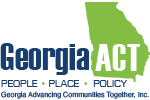The Georgia General Assembly Convenes 40 Day Session Jan. 13, 2020 in a Key Election Year
Happy New Year! 2020 is going to be a wild ride for advocates and elected officials with elections pending all the way up and down the line, from the President, down to both U.S. Senators from Georgia, all members of Georgia’s Congressional delegation, and all members of the Georgia General Assembly. These elections are critical to determining what happens to housing policies and the allocation of resources at the federal and state level. So be sure to register to vote, and encourage your family and friends to register and vote. Please speak up at every opportunity to be sure housing is part of the conversation and that you know where the candidates stand on housing issues before you vote.
Amid the excitement of this political backdrop, the Georgia state legislative session will convene on Monday, January 13, 2020, and continue for 40 legislative days, ending as rapidly as possible by early April so that legislators can return to their Districts and campaign for re-election. (Campaign fundraising is barred during the legislative session.)
You can stay abreast of what is happening at the capitol throughout the session and all year long at www.legis.ga.gov: Read the bios of the people who represent you, learn about committee meetings and agendas, follow the status of legislation and who voted how, and watch floor debates and committee hearings, and much more, all from the legislative website. To find out who represents you at the state capitol, go to www.openstates.org/ga/legislators/. Check out Georgia ACT’s Advocacy Tips for communicating with your legislators here. Read Georgia ACT’s housing advocacy priorities for 2020 here, and stay tuned for advocacy updates and alerts throughout the session to keep you informed as to what is happening and how you can be an effective champion for safe, decent, affordable housing for all Georgians!
We already know that much of the energy this session will focus on issues of funding the state Budget as the Governor proposed cuts of 4% and 6% to the FY 2020 and 2021 Budgets, with some cuts already in effect since October 1, 2019. Hundreds of millions of dollars are in play and programs for healthcare, education, and social services are at risk. At the same time, the Governor has proposed hundreds of millions of dollars in increases to fund his priorities. An added challenge arises from a proposal to reduce the top state income tax rate again as it did in 2018. This proposal would cost the budget another $550 million this year alone and provide only $42 of benefit to median income taxpayers while households with incomes over $500,000 would reap $2,800 per year.
All of these changes affect every Georgian, but especially those poor, low income and vulnerable Georgians already struggling to find safe, decent affordable housing. It is critically important for all advocates to share your concerns and desires with the people who represent you at the state level. We hope you will join us at Housing Day on February 26, 2020, as we stand together to prioritize solutions that give every family the chance for a livable stable home. Register here.
Below are updates on legislative Study Committees and a new initiative from the Atlanta Regional Commission on housing strategies:
House and Senate Study Committees and Commissions have been meeting across the state throughout the fall and Reports have been filed for some but not all. The House Rural Development Council met throughout the summer and fall, and issued their Final Report and Recommendations last month with particular emphasis on economic development,
education and health care, including these recommendations:
· Explore possible expanded funding parameters for the Georgia Environmental Finance Authority (GEFA) to address the lack of broadband access in rural parts of the state identified in a mapping program by the Department of Community Affairs (DCA) expected to be completed in mid-2020.
· Include broadband deployment and operation as an economic development tool that can be financed by local revenue bonds.
· Give rural communities added weight in applications to GEFA to fund water and sewer infrastructure.
· Incentivize the creation of voluntary regional development authorities of three or more counties and allow regional industrial parks to receive OneGeorgia funds to build and equip a general practitioner medical facility.
· Reduce the size of regional commissions’ boards of directors, establish core services they must perform, and implement performance standards under the oversight of DCA. This link will take you to more information about the composition and work of the Council with copies of presentations and videos of the meetings. The House Study Committee on Workforce Housing issued its Final Report in December, noting the importance of homeownership, the impact of housing on Georgia’s economy, the current status of Georgia’s housing market, and state and local programs affecting workforce housing. In reviewing barriers to workforce housing, the Report addressed zoning requirements, government regulations, challenges to sites for manufactured housing, local residential design standard ordinances, and time delays in permit processing as impacting the cost of single-family homes. The Report noted as an additional barrier that “Local government policies can significantly impact multi-family rents.” See, p. 8. Final recommendations included:
· Eliminate local government authority to impose residential design standards.
· Encourage local governments to loosen zoning restrictions, add provisions for density overlays that support small multi-family construction in single-family neighborhoods, support innovative designs for low cost, high-density affordable housing, and create “affordable housing zones” that provide allowances and exchanges and strip out impact fees and permit fees.
· Allow for innovations in building material technology, including “mass timber.”
· Expand the state Low Income Housing Tax Credit (LIHTC) to include single-family homes.
The Atlanta Regional Commission released its Metro Atlanta Housing Strategy, identifying ten types of housing submarkets in the region, providing detailed information and data about each sub submarket, and offering a range of actionable policies and steps that local communities can consider to address their housing needs and priorities. These strategies include: increasing housing supply, preservation, reducing housing and transportation costs, expanding capital resources, promoting housing stability, and developing leadership and collaboration on affordability. Check it out!
Affordable Housing Update Feb 5 2020
Submitted by Elizabeth J. Appley, Esq., Georgia ACT Legislative Policy Advocate







